Your Location:Home > Products > Food Additives > Silicon Dioxide


CasNo: 7631-86-9
MF: O2Si
Appearance: White Powder
Delivery Time: one week
Throughput: 1 million|Metric Ton|Year
Purity: 99%
The chemical compound Silicon Dioxide, also known as silica (from the Latin silex), is an oxide of silicon with the chemical formula SiO2. It has been known for its hardness since ancient times. Silica is most commonly found in nature as sand or quartz, as well as in the cell walls of diatoms.
Silica is manufactured in several forms including fused quartz, crystal, fumed silica (or pyrogenic silica), colloidal silica, silica gel, and aerogel.
Silica is used primarily in the production of glass for windows, drinking glasses, beverage bottles, and many other uses. The majority of optical fibers for telecommunications are also made from silica. It is a primary raw material for many whiteware ceramics such as earthenware, stoneware, porcelain, as well as industrial Portland cement.
Silica is a common additive in the production of foods, where it is used primarily as a flow agent in powdered foods, or to absorb water in hygroscopic applications. It is the primary component of diatomaceous earth which has many uses ranging from filtration to insect control. It is also the primary component of rice husk ash which is used, for example, in filtration and cement manufacturing.
Thin films of silica grown on silicon wafers via thermal oxidation methods can be quite beneficial in microelectronics, where they act as electric insulators with high chemical stability. In electrical applications, it can protect the silicon, store charge, block current, and even act as a controlled pathway to limit current flow.
|
Item |
STANDARD |
|
Appearance |
White powder |
|
Purity (SiO2, %) |
>= 96 |
|
Oil absorption (cm3/g) |
2.0~ 3.0 |
|
Loss on drying (%) |
4.0~ 8.0 |
|
Loss on ignition (%) |
=<8.5 |
|
BET (m2/g) |
170~ 240 |
|
pH (10% solution) |
5.0~ 8.0 |
|
Sodium sulfate (as Na2SO4, %) |
=<1.0 |
|
Arsenic (As) |
=< 3mg/kg |
|
Lead (Pb) |
=< 5 mg/kg |
|
Cadium (Cd) |
=< 1 mg/kg |
|
Mercury (Hg) |
=< 1 mg/kg |
|
Total heavy metals (as Pb) |
=< 20 mg/kg |
|
Total plate count |
=<500cfu/g |
|
Salmonella spp./ 10g |
Negative |
|
Escherichia coli/ 5g |
Negative |